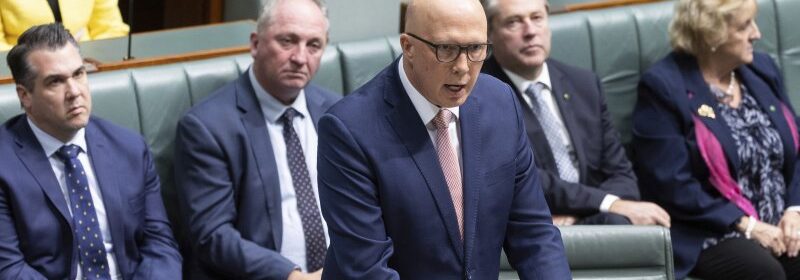Voice debate must not be pulled into vitriol

Save articles for later
Add articles to your saved list and come back to them any time.
It has been a concerning week for supporters of the Indigenous Voice to parliament. While many will dismiss Opposition Leader Peter Dutton’s comments in parliament, calling the proposed constitutional change “Orwellian”, as cheap rhetoric, it is nevertheless clear he has stepped up his No campaign from mild sniping to a full-blown attack.
On Monday, he sought to frame the Voice as a symptom of “identity politics” that favours one group over another, calling it an attempt to re-racialise the country: a “divisive, disrupting and democracy-altering Canberra-based Voice”. Transparent scare tactics, certainly, but Dutton does not need to completely convince; he just needs to sow doubt and confusion.
It saddens, given all that is at stake, that the war for the Voice will be so bitterly fought. What began six years ago at Uluru as a historic decision to call for a meaningful referendum to improve the lives of Indigenous Australians risks being derailed by fear, anger and resurfaced outright racism, particularly in the cesspools of social media.
A spokesperson for the eSafety Commissioner has already reported a more than 10 per cent increase in the proportion of complaints about abuse, threats and harassment of Indigenous Australians online, saying “this will likely intensify as we approach the referendum date, especially targeting First Nations people”.
There was further evidence of how unhinged some elements of the national discussion on race are becoming as the ABC scrambled to deal with the fallout from the decision by veteran presenter Stan Grant, a Wiradjuri-Kamilaroi-Dharrawal man, to step down as host of the network’s flagship Q+A program, citing torrents of racist abuse. “The organisation’s biggest public reckoning on race,” is how The Age’s Osman Faruqi and Max Walden describe the episode. “A reckoning that has sent shockwaves through the media industry.”
Managing director David Anderson subsequently apologised to Grant and said he would review how the ABC tackles racism affecting its staff. But the strength and candour of Grant’s comments unquestionably echo the growing sensitivities around the Voice debate.
Prime Minister Anthony Albanese continues to occupy the higher ground, telling parliament this week that a Yes vote was to stand on the right side of history, that the voice would lead to better outcomes for Indigenous people, and that the upcoming vote would be recognised as a milestone of national progress alongside the 1967 referendum, the Mabo land rights case and the apology to the stolen generations.
His was, once again, a broad appeal to doing the right thing. Yet polling suggests the approach may be losing its initial impact. The Resolve Political Monitor published in The Age in mid-May found that support for the Voice had fallen from 58 to 53 per cent over the previous month and was putting the No camp on track for a majority by August.
There may yet be too many unknowns for many voters – something Dutton’s No camp is happy to exploit. Chief among them is how the Voice will operate in practice given the details will come after, not before, the poll. There are also the continuing legal arguments about the impact of its role in advising executive government. It makes practical sense for Indigenous people to have some access to the officials, not just politicians, who make ground-level decisions about basic services. But the critics worry the Voice will meddle too far in the everyday decisions of the public service, tying it in red tape.
Albanese has dismissed these concerns, and he committed again this week to keeping the referendum question unchanged, pointing out his political opponents had made clear their position before this was a live issue.
On one hand, he is right: this referendum is the result of six years’ work, discussion and compromise. It is probably too late to bring about any major amendment. It means the Yes campaign will have to battle on another front against a foe that is increasingly prepared to play dirty.
“Even if it looks safer on political grounds to delete executive government from the bill, it stays,” writes chief political correspondent David Crowe. “This decision honours the spirit from six years ago because it asks Australians to vote for meaningful change. At the same time, it highlights the determination or stubbornness of the Yes side – the ‘crash through or crash’ approach.”
In April, when Dutton first confirmed he would campaign against the Voice, we noted that amending the constitution was not something to be taken lightly, and it was reasonable for the opposition leader to play devil’s advocate, pressuring the government to make its case ever more convincing, and for him to explain why it continues to fall short, if indeed it does.
But there is a clear line between picking holes in somebody else’s argument and rabble-rousing, especially on such a charged issue as this.
While Dutton has every right to examine how the Voice will work, he must also ensure his campaign against it – and those he runs alongside – does not fuel further hatred and division. This week he came dangerously close to doing so.
Patrick Elligett sends an exclusive newsletter to subscribers each week. Sign up to receive his Note from the Editor.
Most Viewed in National
From our partners
Source: Read Full Article
